Middle East
Russia-Ukraine Black Sea deal: What is it, and will it work? | Russia-Ukraine war News
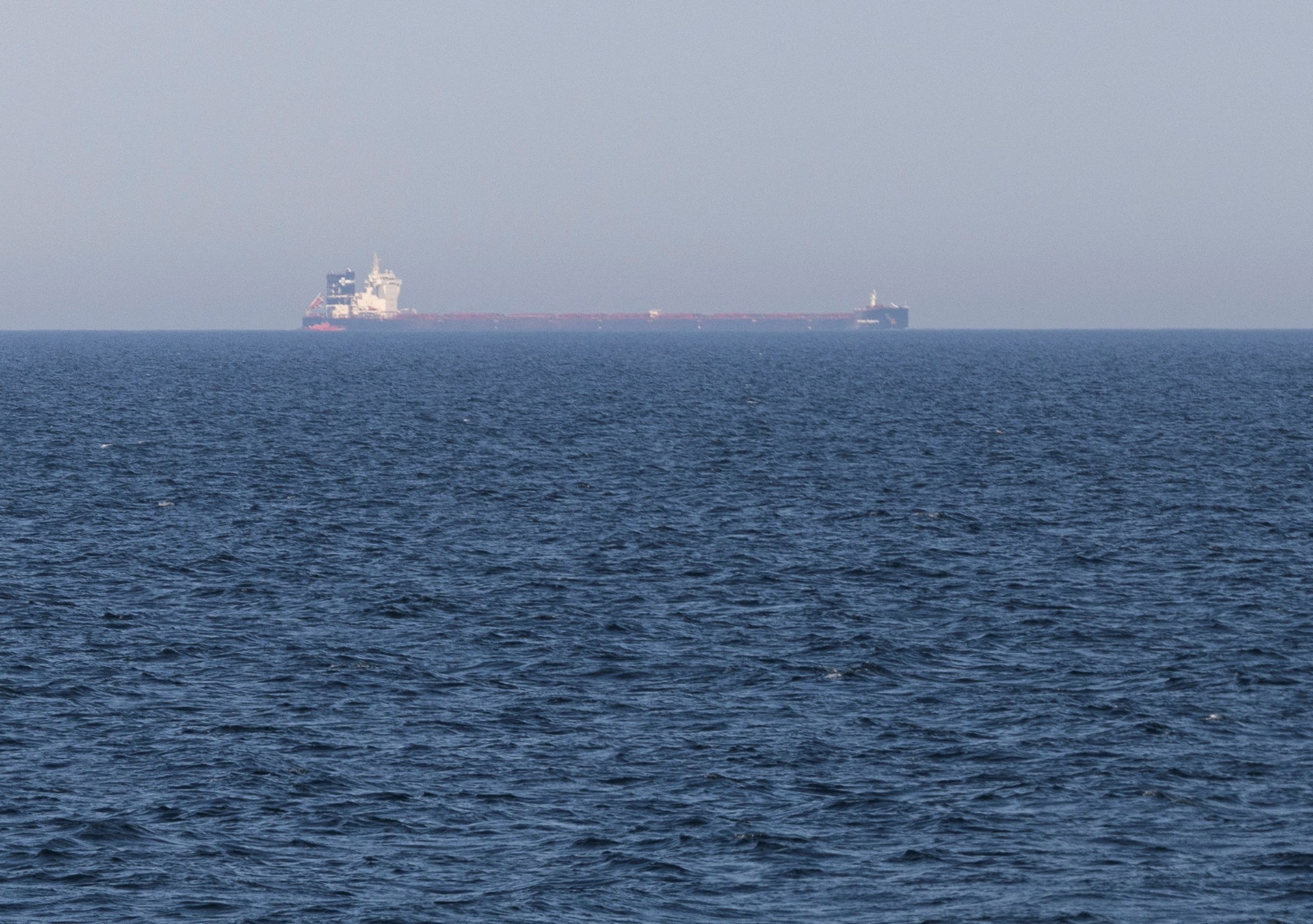
The United States has agreed to help Russia boost its agricultural and fertiliser exports to the world market in exchange for a maritime security deal in the Black Sea.
The White House, the Kremlin and Ukraine announced the deal on Tuesday after teams from the US and Russia met in Saudi Arabia to carve out a pathway towards peace in Ukraine.
These negotiations came amid the Trump administration’s push to end the war in Ukraine that has dragged on since 2022. President Donald Trump shifted US policy on Ukraine by proactively engaging with Moscow and accepting some of its biggest demands, including ruling out Ukraine’s NATO membership.
Here is what the latest deal is about:
What is the Black Sea deal about?
A statement released by the White House on Tuesday said Ukraine and Russia had agreed to stop the use of force and the military use of commercial vessels in the Black Sea.
The White House also issued an almost identical statement, suggesting that the US and Ukraine had agreed to these terms.
The Kremlin issued a statement, adding that the US and Russia would organise “appropriate control measures through inspection of such vessels”, without specifying what these measures would be.
In return, the US will “help restore Russia’s access to the world market for agricultural and fertilizer exports, lower maritime insurance costs, and enhance access to ports and payment systems for such transactions”, the White House statement said.
But the Kremlin statement was more specific in terms of Russia’s demands: it added that the pause on fighting in the Black Sea would come into force only after sanctions are lifted from the Russian agricultural bank, Rosselkhozbank, alongside other financial organisations which work with international food trade, including that of fish products and fertilisers. The Kremlin statement added that these organisations must be connected to the SWIFT system and any sanctions and restrictions on food, fertiliser, ships and agricultural machinery must be lifted.
SWIFT, which stands for Society for Worldwide Interbank Financial Telecommunication, is an international financial artery which allows for the better flow of funds transfers across borders. A month after Russia’s full-scale invasion of Ukraine in February 2022, seven Russian banks were removed from SWIFT. Rosselkhozbank was removed a few months later, in June 2022.
Since the beginning of the war, the US and its allies have placed at least 21,692 sanctions on Russian individuals, media organisations, or institutions in the military, energy sector, aviation, shipbuilding and telecommunications sectors.
The statements said the US and Russia “welcome the good offices of third countries with a view toward supporting the implementation of the energy and maritime agreements”. While the statements did not mention specific countries, Turkiye has previously mediated a Black Sea grain deal, and India has helped convince Russia to stick with it.
What else did the White House and Kremlin say?
Both the White House and Kremlin statements said Washington and Moscow would “develop measures” to implement an earlier agreement between Trump and Russian President Vladimir Putin over a phone call on March 18 to halt attacks on Russian and Ukrainian energy infrastructure.
This agreement was accepted by Ukrainian President Volodymyr Zelenskyy. But as in the past, details remain vague. The latest US and Russian statements do not specify the “measures” that would lead to a halt in attacks on energy infrastructure. Since this agreement, Russia and Ukraine have accused each other of attacking energy infrastructure.
The Kremlin statement added that there is a possibility of “extension and withdrawal from the [ban on energy strikes] agreement in the event of non-compliance by one of the parties”.
How did Zelenskyy respond?
In his nightly video address posted to his X account on Tuesday, Zelenskyy said, “Ukraine is ready to work as swiftly as possible and with absolute transparency to end the war.”
However, he expressed distrust in Moscow, saying: “There is something that the Kremlin is lying about again: that allegedly the silence in the Black Sea depends on the issue of sanctions, and that allegedly the start date for the silence in the energy sector is March 18.”
“If there is renewed military activity in the Black Sea, if Russian manipulations and threats continue, then new measures will need to be taken, specifically against Moscow,” Zelenskyy said.
Ukrainian Defence Minister Rustem Umerov said further discussions were needed to iron out the details of the Black Sea deal.
“The Ukrainian side emphasizes that all movement by Russia of its military vessels outside of Eastern part of the Black Sea will constitute violation of the spirit of this agreement, will be regarded as violation of the commitment to ensure safe navigation of the Black Sea and threat to the national security of Ukraine,” Umerov wrote in an X post on Tuesday. He added that in this scenario, Ukraine “will have full right to exercise right to self-defense”.
“For the effective implementation of the arrangements, it is important to hold additional technical consultations as soon as possible to agree on all the details and technical aspects of the implementation, monitoring and control of the arrangements,” Umerov wrote.
What were the talks on the Ukraine war in Saudi Arabia?
From March 23 to 25, a delegation from the US met separately with Russian and Ukrainian teams in Saudi Arabia’s capital Riyadh.
The Russian delegation was led by diplomat Grigory Karasin, who has previously been deputy foreign minister and ambassador to the United Kingdom. Alongside Karasin, the Russian team also included Sergei Beseda, a veteran of Russia’s Federal Security Service (FSB). The Ukrainian delegation was led by Ukrainian Defence Minister Rustem Umerov and Pavlo Palisa, a top military adviser to Zelenskyy.
The Reuters news agency reported that the US team included White House National Security Council’s senior director, Andrew Peek, and Director of Policy Planning Staff Michael Anton, according to a source briefed on planning for the talks in Riyadh.
How did we get here?
This deal is a resumption of the Black Sea Grain Initiative, struck in 2022 with the mediation of the United Nations and Turkiye.
The initiative entailed a three-year memorandum of agreement allowing the safe export of 33 million metric tonnes of Ukrainian grain across the Black Sea despite the war. In return, UN officials agreed to facilitate Russian food and fertiliser exports to foreign markets.
In 2023, Moscow pulled out of this deal, citing difficulties and hurdles in exporting its own food and fertilisers. While Russian food and fertiliser companies are not the target of Western sanctions, Moscow said restrictions on logistics, payments and insurance fees had hindered shipping.
In advance of the talks in Riyadh, US National Security Advisor Mike Waltz told CBS News on March 23 that the resumption of the grain deal would be the main focus of the talks. “We are now going to talk about a Black Sea maritime ceasefire so that both sides can move grain, fuel, and start conducting trade again in the Black Sea,” he said.
Could the deal help restore peace over the Black Sea?
John E Herbst, a senior director at the Washington, DC-based think tank Atlantic Council, called the deal a “useful step, but not a major one” in an analysis published on its website. This is because the Black Sea has not seen major military activity after Ukrainian naval drones chased the Russian Black Sea Fleet out of Crimea, he added.
On the other hand, Matthew Kroenig from the Atlantic Council wrote that the announcement was “a step toward circumscribing the conflict on the road to eventual peace”.
Daniel Fried, the Weiser Family distinguished fellow at the Atlantic Council, had a different view, however.
“The United States risks being sucked down a rabbit hole of concessions, easing pressure on Russia while Russian forces continue to attack Ukrainian cities and civilians,” Fried wrote on the Atlantic Council website. “Today’s deal is no peace through strength.”
What’s next?
Future talks between the US and Russia would see the involvement of the UN and other countries, Russian news agency TASS reported, citing Karasin.
“Everything was discussed – there was an intense, challenging dialogue, but it was very useful for us and for the Americans,” Karasin said.
“We will continue to do this, involving the international community, first of all, the United Nations and individual countries,” said Karasin, without specifying which individual countries he was talking about.
“In general, the impression was of a constructive dialogue, which is needed and necessary. The Americans are also interested in this.”
How is Europe viewing the Riyadh talks?
United Kingdom Prime Minister Keir Starmer and French President Emmanuel Macron are expected to hold talks on Thursday to discuss a “coalition of the willing” that the British leader had announced on March 2.
The idea is that a coalition of Ukraine’s willing European allies would devise terms for peace and present them to the US, and potentially play a prominent role in offering security guarantees to Ukraine under any peace agreement with Russia.
However, Europe has been kept out of the recent discussions in Saudi Arabia, and the coalition was not mentioned in the White House and Kremlin’s statements.
Trump’s Middle East envoy, Steve Witkoff, who has been involved in the Russia-Ukraine negotiations, described Starmer’s idea as “a combination of posture and pose” in an interview with conservative journalist Tucker Carlson, which streamed online on March 22.
Middle East
Israeli army only finds ‘professional failures’ in Gaza aid worker killings | Israel-Palestine conflict News
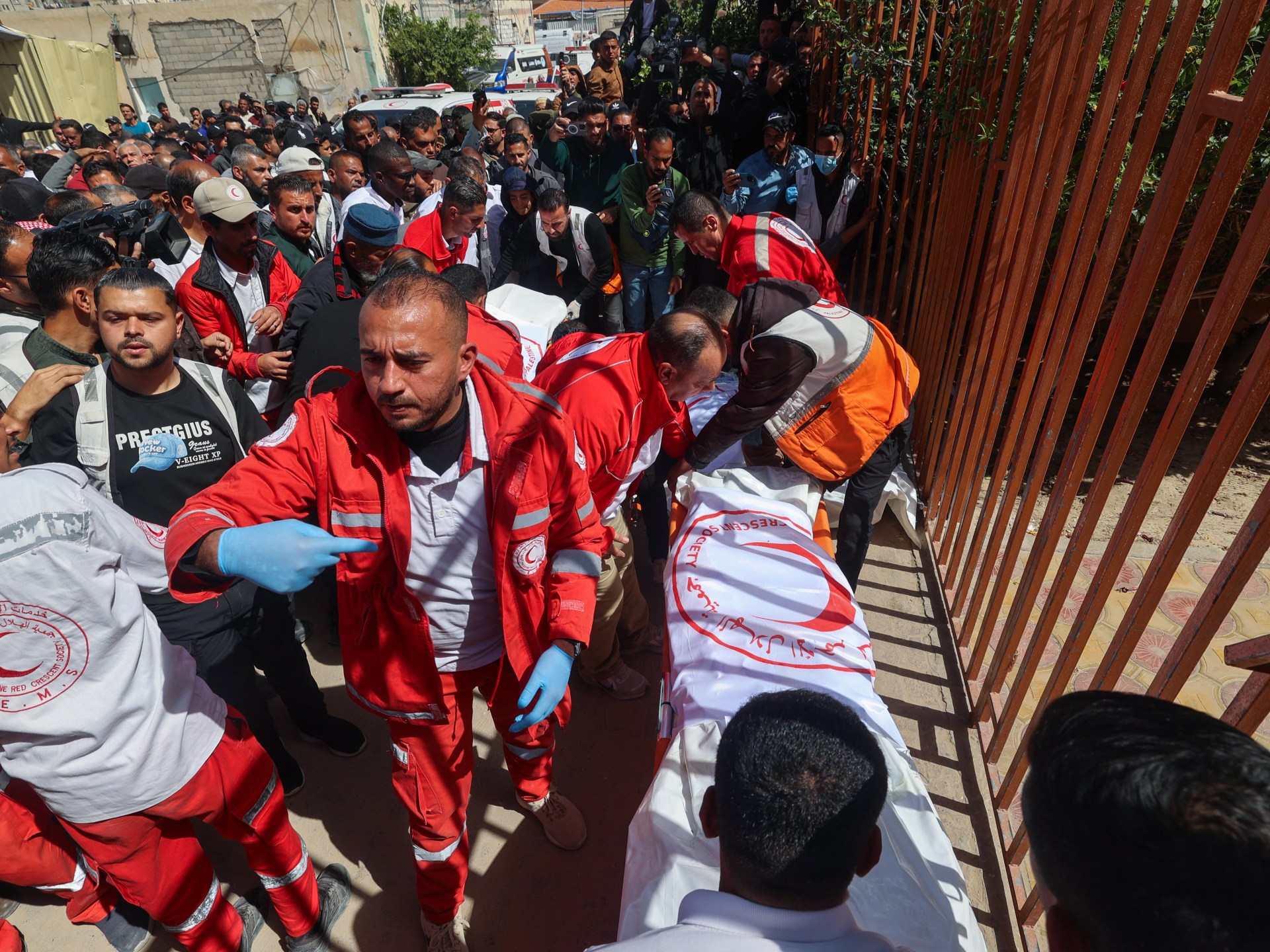
The Israeli military has released details of an investigation into its own killing of 15 Palestinian paramedics and aid workers in Gaza last month, saying its code of ethics was not violated and only one soldier is dismissed, in an attack that sparked outrage in the international community.
The Palestine Red Crescent Society (PRCS) and the Israeli rights organisation Breaking the Silence rejected the findings of the Israeli probe on Sunday.
PRCS’s president told Al-Araby TV that the Israeli narrative on the killings in Rafah was “contradictory”.
“It is incomprehensible why the occupation soldiers buried the bodies of the paramedics in a criminal manner,” Younis al-Khatib said.
Al-Khatib added that the Israeli army communicated with the paramedics before killing them and that the evidence – including a video showing their ambulances flashing emergency lights – proved “the falsity of the occupation’s narrative regarding the limited visibility at the site”.
“An independent and impartial investigation must be conducted by a UN body,” he said.
PRCS, which had medics killed by Israel in the incident, also denounced the Israeli report as “full of lies” on Sunday. “It is invalid and unacceptable, as it justifies the killing and shifts responsibility to a personal error in the field command when the truth is quite different,” Nebal Farsakh, spokesperson for the organisation, told the AFP news agency.
The PRCS said last week that it received confirmation from the International Committee of the Red Cross (ICRC) that one of its medics who was missing is being held by Israel.
🚨Urgent: We have been informed by the International Committee of the Red Cross that PRCS medic Assad Al-Nsasrah is being held by the Israeli occupation authorities. His fate had remained unknown since he was targeted along with other PRCS medics in #Rafah.
📢We call on the… pic.twitter.com/l0oOxujS8G— PRCS (@PalestineRCS) April 13, 2025
The Israeli army on Sunday claimed that six of the aid workers who were killed and buried in a shallow mass grave along with their ambulances were Hamas “terrorists”, without providing any evidence.
It admitted its probe detected a series of “professional failures”, including partial and inaccurate reporting by the commanding officers in the field invading southern Gaza’s Rafah.
The deputy commander of the Golani Reconnaissance Battalion will be dismissed, while the commanding officer of the 14th Brigade is to receive a reprimand.
The examination also found “no evidence to support claims of execution or that any of the deceased were bound before or after the shooting”, despite the testimonies and the evidence.
The Israeli military had initially claimed that the ambulances and aid workers were not clearly marked as first responders and approached its troops “suspiciously”.
A mobile phone video recorded by one of the killed aid workers that was obtained by the New York Times showed that the crew were clearly marked and visible to Israeli forces, and were killed by Israeli fire that lasted several minutes.
United Nations and Palestinian officials later found the mass grave and the bulldozed ambulances and bodies after Israeli authorities granted access to the area of the mostly destroyed city of Rafah bordering Egypt.
‘Another day, another cover-up’
The Israeli anti-occupation group Breaking the Silence said the military investigation is “riddled with contradictions, vague phrasing, and selective details”.
“Not every lie has a video to expose it, but this report doesn’t even attempt to engage with the truth,” the group said. “Another day, another cover-up. More innocent lives taken, with no accountability.”
But far-right voices in the government of Israeli Prime Minister Benjamin Netanyahu believe the army is going too far in punishing the soldiers.
Itamar Ben-Gvir, Israel’s ultranationalist national security minister, said the decision to dismiss the deputy commander was a “grave mistake” that must be reversed.
“Our combat soldiers, who are sacrificing their lives in Gaza, deserve our full support,” he said.

‘Report invites many questions’
Human rights lawyer Geoffrey Nice told Al Jazeera that the findings of the probe raise questions about the Israeli military’s conduct in Gaza and the thoroughness of the investigative process.
“It’s a pretty surprising document. It’s also a document that invites many questions that it will be difficult, I suspect, for the [Israeli military] to answer,” Nice said in a television interview.
“For example, [there is] the proposition that six of these people were Hamas, presumably members of Hamas on active [military] service, not people who might have been associated with Hamas in some way. No documentary evidence at all is identified [for that].”
Israel has a track record of denying accusations of wrongdoing and contradicting its own earlier statements.
Past investigations have exonerated the armed forces or placed the blame on a single individual without broader repercussions.
The UN accused the Israeli military of being responsible for the killing of the 15 aid workers, along with the killing of a Bulgarian UN staff member and wounding of six other foreign staff in Gaza’s Deir el-Balah last month.
The organisation has been forced to significantly cut its staff in Gaza as the war’s death toll continues to mount.
Middle East
Lebanese president says disarming Hezbollah ‘delicate’ as Israel kills two | Israel attacks Lebanon News
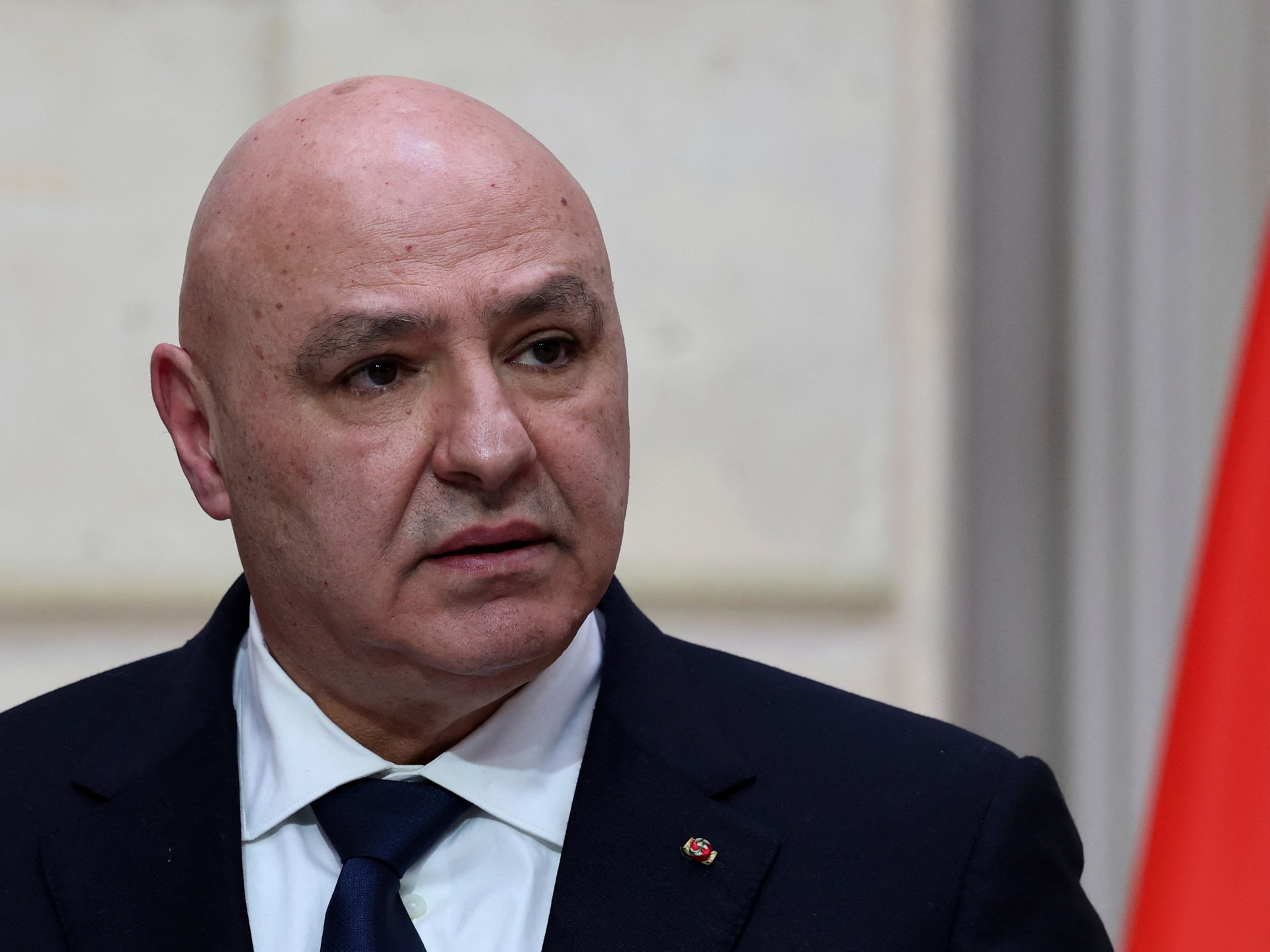
Joseph Aoun makes the comment as the Lebanese army says it foils a rocket attack on Israel.
Lebanese President Joseph Aoun says he will not be rushed to disarm Hezbollah under unfavourable circumstances as the Israeli military continues to launch deadly air strikes on the country in violation of a November ceasefire.
In comments to reporters after a meeting with a Maronite patriarch to mark Easter on Sunday, the former army chief said he considers disarming the Iran-aligned group a “sensitive, delicate issue” that must be handled with consideration to preserve national peace.
“Any controversial domestic issue in Lebanon can only be approached through conciliatory, nonconfrontational dialogue and communication. If not, we will lead Lebanon to ruin,” Aoun said.
The Trump administration has been applying sustained pressure on Beirut to push for the disarming of Hezbollah, leading to Aoun announcing last week that he hopes to complete the process by the end of 2025 – the first time a senior official has set any deadline.
Aoun’s comments on Sunday came shortly after the Lebanese government praised the army for foiling an imminent attack on Israel, a first since the November ceasefire with Hezbollah, which Israel has violated on numerous occasions.
The Lebanese army released images of confiscated rockets and launch pads and said it arrested multiple individuals previously involved in rocket attacks on Israel as well.
The raid that led to the confiscated munitions was reported to have taken place in the Sidon area of southern Lebanon.
The office of Prime Minister Nawaf Sharif urged security forces to “thwart suspicious plots that seek to embroil Lebanon in further wars” and said this work proves that the Lebanese state is moving towards full sovereignty over its territory with its own forces.
“The Lebanese state alone is the authority that makes decisions regarding war and peace and is the body authorised to possess weapons,” he said.
Hezbollah has not immediately reacted to Sunday’s statements, but its leader Naim Qassem said on Friday that the group “will not let anyone disarm” it, especially as the Israeli military continues to occupy parts of southern Lebanon.
Hezbollah was formed in the aftermath of the Israeli invasion of Lebanon in 1982 and grew over the decades to possess substantial political and military power. This included forcing Israel out from its occupation of southern Lebanon in 2000 and fighting Israel to a stalemate in a 2006 war.
But the organisation has lost many leaders in Israeli assassinations as well as much military equipment since the start of Israel’s war on Gaza in October 2023 and must withdraw its military forces from southern Lebanon as part of the ceasefire.
Israeli air strikes kill two
Lebanon’s Ministry of Public Health said on Sunday that two people were killed in two Israeli air raids in southern Lebanon.
Israeli warplanes fired at least two missiles at a house in Hula, a village in Nabatieh governorate, killing one person, the ministry said.
An Israeli drone attack also targeted a vehicle in Kaoutariyet as-Siyad, killing another person, it said.
The footage below, which has been verified by Al Jazeera’s Sanad fact-checking agency, shows plumes of smoke rising after Israeli air strikes targeted the heights of the Iqlim al-Tuffah region of southern Lebanon.
مراسل الجديد: سلسلة غارات عنيفة من الطيران الحربي إستهدفت أطراف مليتا ومرتفعات إقليم التفاح@farhat_muhamad1 pic.twitter.com/8TMHLdc06q
— Al Jadeed News (@ALJADEEDNEWS) April 20, 2025
The Israeli military said one of its strikes on southern Lebanon killed a deputy head of a Hezbollah unit responsible for smuggling weapons and funds to the group, including across the country’s border with Syria.
The army added that the targeted man was “extensively involved” in Hezbollah efforts to revitalise after the group took heavy blows during the war.
After killing two other people on Saturday, the Israeli army also claimed they were Hezbollah members.
Middle East
‘Little guest’: How a rescued baby brought two Gaza families together | Israel-Palestine conflict
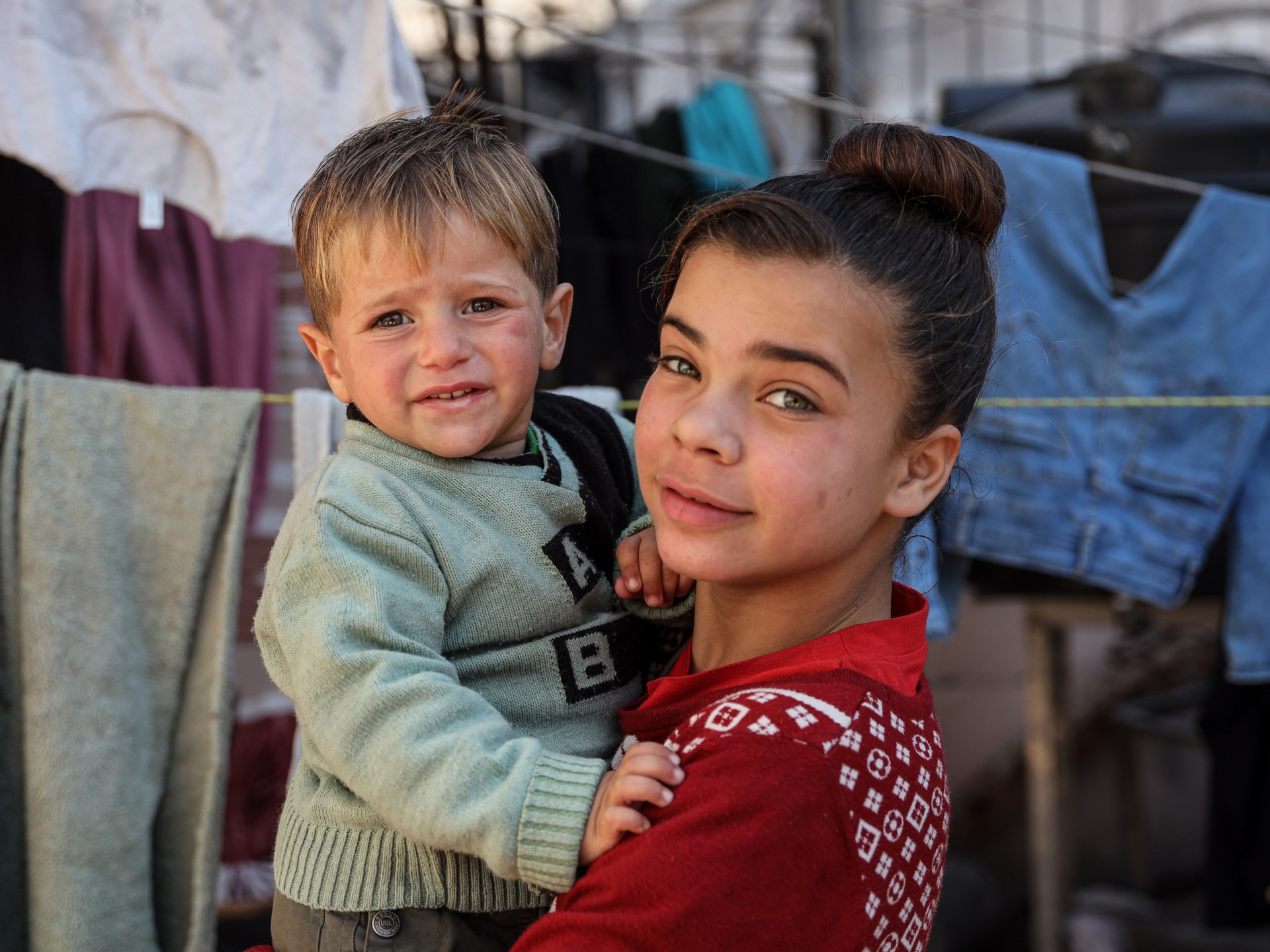
Jabalia, Gaza – Between the arms of his father and the family who cared for him during his disappearance, little Mohammed plays happily.
About 16 months ago, a 13-month-old Mohammed sat crying beside his mother’s lifeless body, surrounded by the dead and wounded, after an attack on the school the family was sheltering in.
That day, amid the chaos and fear as displaced families fled, he disappeared.
His father, Tareq Abu Jabal, spent more than a year looking for Mohammed while, unbeknownst to him, another man from the school was looking for Tareq.
‘A little guest’
Rasem Nabhan and his family were also displaced and sheltering in al-Rafei School in Jabalia in northern Gaza when two Israeli bombs hit it in late December 2023.
“We were terrified, the children were screaming,” the 41-year-old said. “Moments later, quadcopters appeared, broadcasting orders for everyone to evacuate immediately. There was gunfire everywhere.”
Rasem focused on getting his wife and seven children out of the school with the other women and children, then ran to help extinguish the flames still burning in the bombed classrooms. They needed to check if anyone was left alive.
![The story of the lost child in Gaza 2025 [Abdelhakim Abu Riash/Al Jazeera]](https://www.aljazeera.com/wp-content/uploads/2025/04/873A6295-copy-1744828206.jpg?w=770&resize=770%2C513)
“Blood covered the walls. … Body parts were scattered on the floor among the wounded and the dead. It was beyond words,” Rasem said.
Amid the carnage, he said, “I saw a baby crying and screaming. Next to him lay the body of a woman – her head and stomach torn apart, her body covered in blood. I think she was his mother.”
He picked up the child and ran, not thinking. “The baby’s face was red, and he could barely breathe, he was crying so hard.”
“I kept asking people around me: ‘Do you know this child? His mother was killed.’ But no one did,” he recounted. “It was impossible. … It felt like the Day of Judgement, everyone fleeing, clutching their children.”
Tanks had surrounded the school by then, he said, forcing everyone to walk south. Rasem walked with the baby in his arms until he reached his wife, who was waiting for him by the road with their children.
“I handed the child to my wife and told her I’d found him at the school with his dead mother,” he said.
Fawakeh Nabhan, Rasem’s 34-year-old wife, took the baby as her older daughters clamoured to be allowed to hold him.
“For a moment, the fear faded as we welcomed this little guest,” she said. “He had the most beautiful face, and I felt an instant connection.”
They nicknamed the baby Hamoud, the diminutive for Mohammed and Ahmed, two popular names, and took him along as they walked south towards Rashid Street, passing through the Israeli army’s Netzarim checkpoint.
They took turns carrying the baby – Rasem, Fawakeh and their two older daughters, 19-year-old Islam and 18-year-old Amina.
“He would fall asleep and wake up in our arms, like any other child, unaware of what was going on around him,” Fawakeh said.
Growing attached
The family didn’t know how old the baby was, but they guessed he was seven to nine months old, based on his size and weight.
“We’d never seen him at the school before and had no idea [about] his real age or when he was born,” Fawakeh added.
The family walked to central Gaza’s Deir el-Balah, resting there a while before continuing to Khan Younis in the south, where they had heard there were spots available at another school-turned-shelter.
“Despite the risks, I felt a school was better than living in a tent. At least we would have a concrete roof over our heads,” Fawakeh said.

The story of their displacements is long and complex because they moved from school to displacement camp to sleeping rough back to a tent for months.
Through it all, Rasem and Fawakeh saw the baby as a source of warmth and joy.
“At first, he was withdrawn and silent, never laughing, no matter how much we tried. For nearly 50 days, he was like that – as if he were searching for his mother and wondering who we were,” Rasem recalled. “But over time, he started to open up. He grew attached to us, and we to him.”
Throughout their displacement, Fawakeh, with Islam and Amina, cared for the baby. But when it came to feeding him, Fawakeh insisted on doing it herself.
But caring for a baby as Israel wages its genocidal war on Gaza is a huge financial strain because formula, diapers and nutritious food are either not available or are exorbitantly priced.
“When we arrived in the south, we bought formula and a pacifier, but he refused. I think he was breastfed by his mother,” Fawakeh said. “In a way, that was a relief because formula was expensive. Instead, I fed him lentils, beans, rice. He ate whatever we ate.”
“He loved bananas so much. We could only afford two – one for him and one for my four-year-old son, Abdullah.”
Diapers had to be rationed as their price skyrocketed, reaching 10 shekels a diaper (about $2.70).
“I would put one diaper on him at night, and during the day, I used cotton cloths that I changed frequently,” Fawakeh explained.
Blessings
As the family moved around, the baby became well known and adored, bringing blessings to the family, Rasem said.
Hamoud did not look like the Nabhans, and people would ask Rasem and Fawakeh about him. When they heard his story, their hearts would melt, and they would shower the little boy with whatever small gifts they could find.
“Our neighbours in the camp would send us plates of food just for him,” Fawakeh said with a laugh. “They would say, ‘Make sure he eats this.’”
![The story of the lost child in Gaza 2025 [Abdelhakim Abu Riash/Al Jazeera]](https://www.aljazeera.com/wp-content/uploads/2025/04/873A6285-copy-1744828233.jpg?w=770&resize=770%2C513)
“He calls my husband Baba and me Mama. He sleeps in my lap, runs straight to me when he needs comfort,” Fawakeh said, lowering her voice as she glanced at her youngest son.
“Abdullah, my four-year-old, would get so jealous and cry whenever I gave the baby too much attention.”
Overall, the couple’s children – Mohammed, 20; Islam, 19; Amina, 18; Maryam, 12; Nour el-Huda, 10; Mustafa, nine; and Abdallah, four – embraced the baby as one of their own.
Despite numerous offers from organisations, orphan sponsorship programmes and even other families willing to adopt the baby, Rasem refused.
“He is my eighth child. I love him deeply, and I refused the idea of someone taking him from me,” Rasem said.
“My answer was always firm: The only way I would ever let him go is if I found his real family.”
Then, in a hushed voice, he confessed: “But in my heart, I prayed I wouldn’t find them. I stopped searching. We had become too attached.”
A father’s search
As Rasem spoke, Mohammed’s father Tareq, 35, sat nearby listening, smiling at his youngest son.
The father of three – Omar, 14; Tolay, nine; and Mohammed, now 26 months – had never stopped looking for his missing child.
“On the day al-Rafei School was bombed, my wife and three children were inside our classroom,” Tareq recalled. “I was in the schoolyard when the air strike hit. I ran, screaming, towards them.”
The Israeli army had shelled both al-Rafei and the school next door. “In that strike, my wife, my nephew and six others were killed – eight lives lost in an instant,” he said.
“When I reached our classroom, I saw Omar and Tolay, both injured. Omar had shrapnel in his back, and my daughter had been struck in the stomach. Then I saw my wife. … Her body was torn apart.”
His voice faltered. “I collapsed. But somehow, I forced myself to help evacuate her body with the others.”
His wife, Iman Abu Jabal, was 33. Tolay carried shrapnel in her stomach for three months.
“Grief, fear for my wounded children, the screams, the rush to evacuate, the army’s drones circling overhead,” Tareq recounted. “In the panic, I didn’t take Mohammed with me when I carried his siblings out.”
When he went back for Mohammed, he couldn’t find him. The baby was gone.
“I started asking everyone,” he said. “Some told me he had been killed. Others said someone took him. The stories kept changing.”
![The story of the lost child in Gaza 2025 [Abdelhakim Abu Riash/Al Jazeera]](https://www.aljazeera.com/wp-content/uploads/2025/04/873A5680-copy-1744828194.jpg?w=770&resize=770%2C513)
“I was devastated. I searched through the crowds, but everyone was running, screaming, grabbing their children and fleeing,” he added.
He was not able to find his baby.
He went back into the school with a few others to bury the victims of the bombing.
“We wrapped my wife’s body in a sheet and waited for three hours in a classroom, unable to go outside to the yard to bury her,” Tareq recalled.
“The shelling and gunfire were relentless, but I wanted to bury my wife, no matter what.”
Among those who remained at the school was a surgeon who treated the wounded, including Tareq’s children, as best he could.
“My nephew was bleeding heavily. A young man helped him leave the school and walk to al-Awda Hospital in Jabalia, but he arrived in critical condition and passed away there.”
Tareq and the children spent the night in the school with the others who had stayed to bury their loved ones. In the morning, they snuck out through a gap in the school’s walls, taking detours to reach his brother’s house in western Jabalia.
After dropping the older kids off, Tareq spent the rest of the day searching the hospitals in Jabalia for Mohammed, then at the various spots where displaced people had gathered.
“I was told a family had taken him to the south while others hadn’t seen or heard anything about him.”
But Tareq also had to focus on his other children, traumatised by seeing their mother die and in need of food, medicine and care.
By the end of February 2024, northern Gaza was in the grips of famine, so Tareq decided to move south to save the children from the severe hunger sweeping the region.
As soon as he arrived in Rafah, Tareq resumed his search for Mohammed.
“I started asking relatives, acquaintances and neighbours who were with us in the school we had fled from, but I found no trace of him,” he continued. “I spent days like this until I lost all hope and turned to God.”
“I was seeing people fleeing, leaving their children behind in the bombings and evacuations. I saw children lost and crying. … It made me think about my child.”
![The story of the lost child in Gaza 2025 [Abdelhakim Abu Riash/Al Jazeera]](https://www.aljazeera.com/wp-content/uploads/2025/04/873A5779-copy-1744829776.jpg?w=770&resize=770%2C513)
Reuniting
On January 27, when displaced families were allowed to return to northern Gaza, the Abu Jabals and the Nabhans walked back to Jabalia.
“By 8am, my children and I were standing on the rubble of our home in Jabalia,” Tareq told Al Jazeera. “We had set out at 4am – we couldn’t wait any longer.”
Rasem and Fawakeh’s family headed out a bit later, and along the way, they were stopped for an interview.
“I talked about my joy to be going back. Then the journalist asked me about the baby, thinking he was my son and how he had grown up in the south,” Rasem recalled.
“I told her he wasn’t my son and explained his story. She was so moved, she made a plea on air for anyone to identify the child’s family,” Rasem added.
The family eventually got to Rasem’s parents’ home in Jabalia, not too far, as they would find out later, from Hamoud’s “real” family.
The next morning, Tareq came across the video from the TV interview.
“His features hadn’t changed although he had grown a little. I started shouting out across the rubble: ‘My son’s alive! My son Mohammed is alive!’
“My brother, his wife, the family and neighbours rushed over, asking what was wrong.
“We all watched the video together. Rasem’s face was familiar because we’d been sheltering at the same school.”
Asking around, Tareq figured out where Rasem’s family was staying and rushed over.
“Me, my children and brother went over, and I introduced myself to Rasem, who recognised me right away.
“Mohammed didn’t recognise me and cried,” he said, smiling in gratitude anyway.
The Nabhans were conflicted, happy that Hamoud, who they now knew was named Mohammed, had found his family but sad that he was leaving.
“It felt like I was giving away a piece of my soul,” Rasem said. “The hardest moment was when they left, and Hamoud was calling me, crying, ‘Baba, Baba!’”

“I spent the night crying from the sadness over Hamoud’s departure,” Fawakeh said, her eyes brimming with tears.
“My daughters cried for an entire week. The house felt like a wake. Hamoud had become a part of us,” Fawakeh added as she held the visiting Mohammed, who still calls her Mama, close.
“I told my husband and Tareq that Hamoud should come see us often. He’s like our son, and he’s very attached to me.
“Luckily, they live nearby, and my children always go to bring him over, so he can spend time with us. He brings us such joy,” she beamed.
Watching the Nabhans playing with his son, Tareq smiled. “I’m so grateful to them, from the bottom of my heart. They raised him as if he were their own. … He was with a family who showed him the love and care of the mother he lost.
“But as you can see, when Mohammed sees Rasem, his wife and their family, he completely forgets about me,” Tareq said.
“He loves them so much.”
-
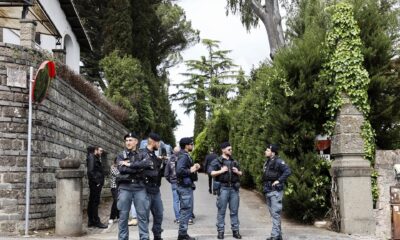
 Middle East1 day ago
Middle East1 day agoIran says progress in nuclear talks with US, confirms third round next week | News
-
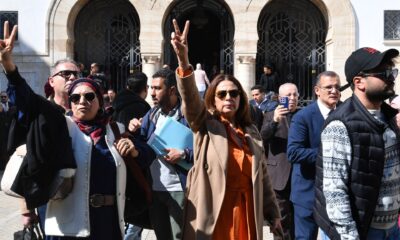
 Middle East2 days ago
Middle East2 days agoTunisian court hands opposition figures lengthy jail terms | Human Rights News
-
Lifestyle2 days ago
The 250th anniversary of the Battles of Lexington and Concord opens debate over US independence
-
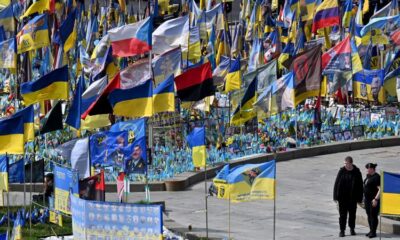
 Europe1 day ago
Europe1 day agoRussia Ukraine truce: The real strategy behind Russia’s sudden truce announcement
-

 Europe1 day ago
Europe1 day agoLive updates: Trump news on Iran and Ukraine talks, immigration crackdown, tariffs
-
Asia1 day ago
Hong Kong’s oldest Democratic Party is shutting down as Beijing leaves no room for dissent
-
Middle East1 day ago
Israeli bombardment of Gaza kills 92 in two days: Health Ministry | Israel-Palestine conflict News
-
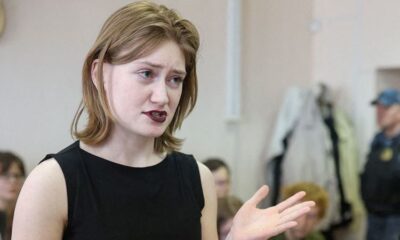
 Europe1 day ago
Europe1 day agoRussia sentences 19-year-old woman to nearly three years in a penal colony after poetic anti-war protest




